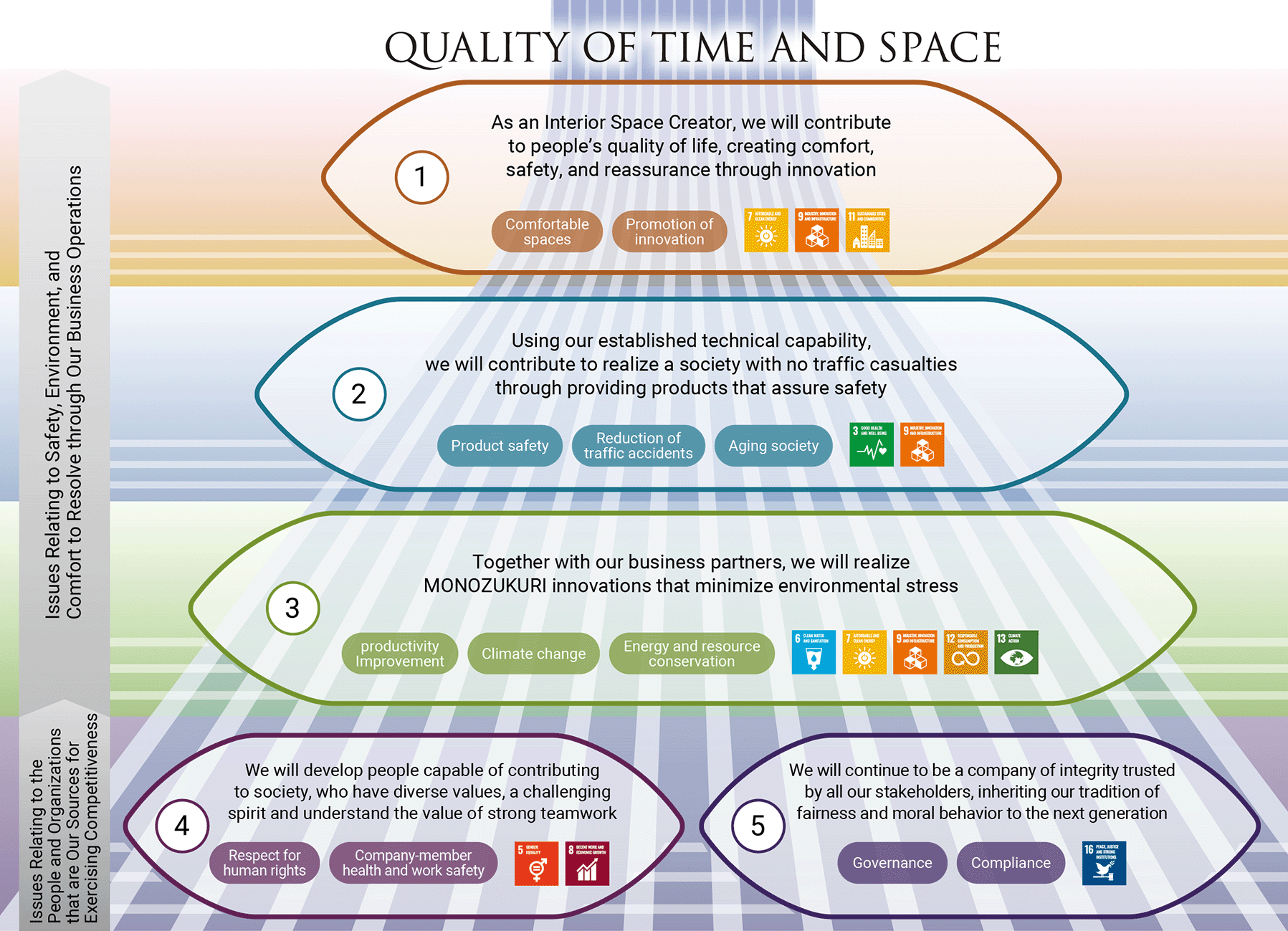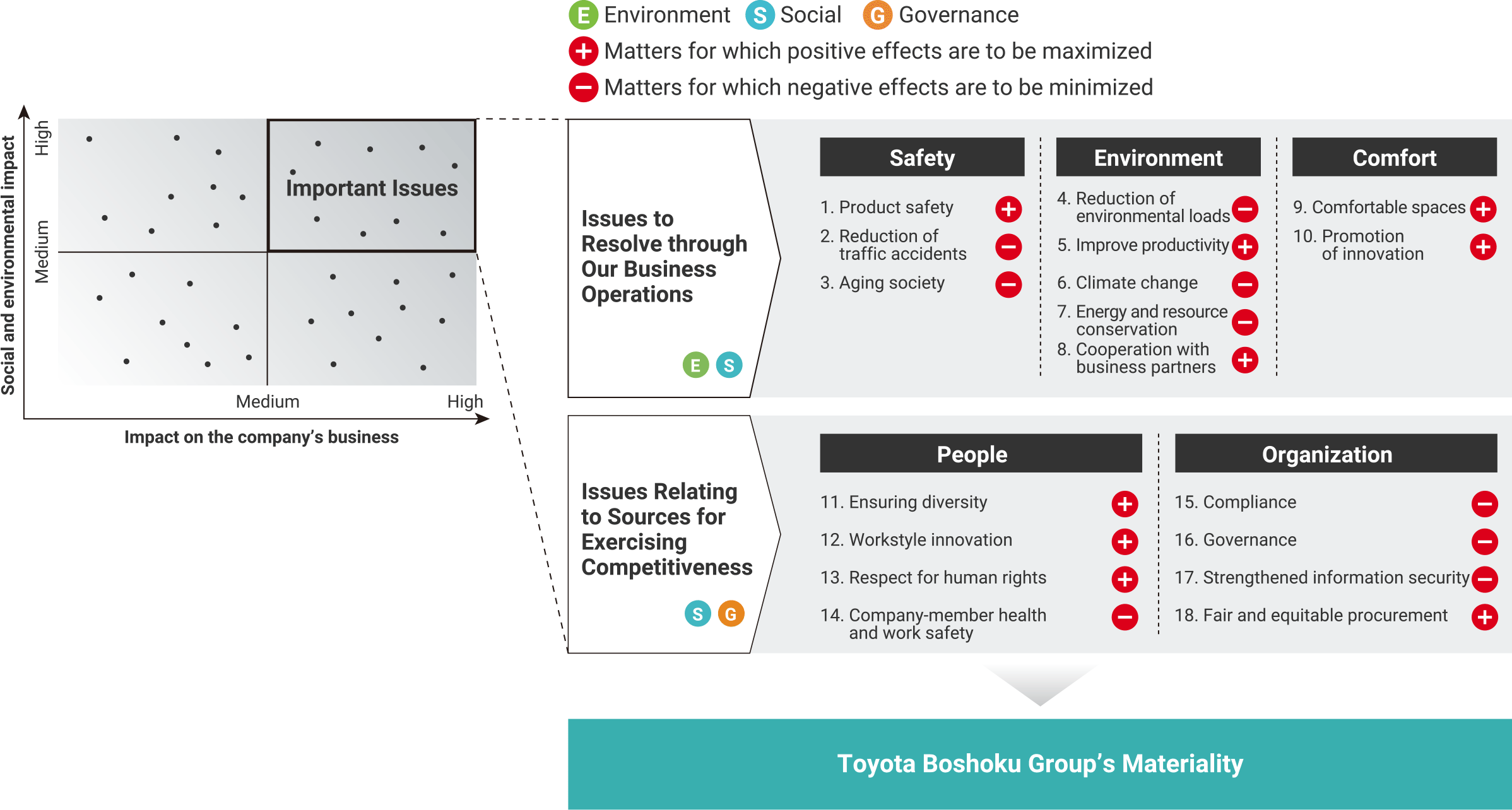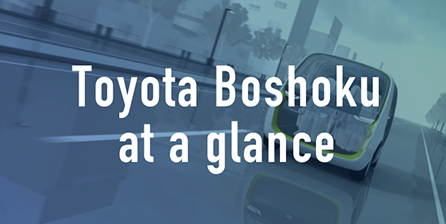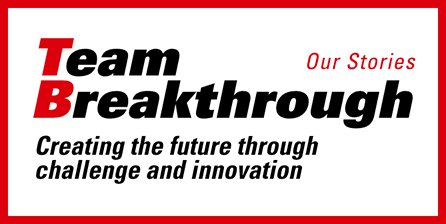Toyota Boshoku Group’s Materiality
At the Toyota Boshoku group, as we strive to transform from CSR*1 to CSV*2management, we have continued to enhance our corporate value by contributing to the realization of a sustainable society through our business operations. Contributing to society is a management approach we have inherited from our founding spirit of “for the world and for people.”
With the goal of enhancing corporate value, we have formulated the Toyota Boshoku group’s materiality as part of the process of drafting the 2025 Mid-Term Business Plan. We defined as our materiality the identification of important issues to be resolved through our business operations from among a variety of social issues and the approach we adopt to resolve them.
At the CSV Promotion Meeting (Chairperson: CSO (Chief Strategy Officer) in charge of the Corporate Planning Segment), which is held twice a year, issues and the direction to take for enhancing corporate value based on our approach to CSV are reported and deliberated on, and consideration is also given to reviewing materiality itself in response to changes in the environment. Progress on the ESG KPIs, which manage progress on materiality, are also checked at the CSV Promotion Meeting, and the degree of achievement is followed up along with materiality.
- Corporate Social Responsibility
- Creating Shared Value
Materiality Approach
- Classified into those that “maximize the positive effects,” which enrich people and their lives, and those that “minimize the negative effects,” which avoid risk
- Organized into “Issues Relating to Safety, Environment, and Comfort to Resolve through Our Business Operations,” and “Issues Relating to the People and Organizations that are Our Sources for Exercising Competitiveness”

Formulation of five aspects of materiality
Toyota Boshoku Group’s Materiality

Plotting of social issues and extraction of important issues

The Meaning and Concepts of Materiality
| Issues Relating to Safety, Environment, and Comfort to Resolve through Our Business Operations | |||
|---|---|---|---|
| (1) | As an Interior Space Creator, we will contribute to people’s quality of life, creating comfort, safety, and reassurance through innovation
|
Toyota Boshoku group has consistently developed its operations “for the world and for people,” expanding from textiles into automotive interiors and contributing to the enhancement of safety and reassurance in people’s daily lives. We are evolving into an Interior Space Creator, providing products and services such as those employing sensor-based biometric information to achieve comfort, which means enabling people to live with confidence while staying true to themselves (realization of smart cities). |
|
| (2) | Using our established technical capability, we will contribute to realize a society with no traffic casualties through providing products that assure safety
|
To contribute to the ambitious target of a society of “zero traffic casualties,” we will continue to offer high-quality, high-safety products (integrated seats, seatbelts, airbags, and other such products) and services that optimize Toyota Boshoku’s strengths in R&D that is part of Toyota Boshoku’s identity. |
|
| (3) | Together with our business partners, we will realize MONOZUKURI innovations that minimize environmental stress
|
Aiming for a sustainable global environment in which children can live happily with smiles on their faces, we will make effective use of business resources and achieve the Challenge 6 goals in our 2050 Environmental Vision. To accomplish this, we will work with our business partners to realize innovation and improve productivity in MONOZUKURI (and all manufacturing-related processes), utilizing the latest leading-edge technologies, while promoting initiatives focusing on the three priority areas of global warming prevention, resource circulation, and co-existence with nature. |
|
| Issues Relating to the People and Organizations that are Our Sources for Exercising Competitiveness | |||
| (4) | We will develop people capable of contributing to society, who have diverse values, a challenging spirit and understand the value of strong teamwork
|
To continue challenging ourselves to find solutions for the world’s problems, we will develop autonomous human resources by bringing together talented individuals from around the world, who understand different ideas and ways of thinking, respect one another, and think together. |
|
| (5) | We will continue to be a company of integrity trusted by all our stakeholders, inheriting our tradition of fairness and moral behavior to the next generation
|
To continue being a company that is trusted by all stakeholders and grows together with them, we will continue to practice “ensuring that our corporate activities are fair and transparent,” as enshrined in our corporate philosophy and the Principles of Toyoda that embody the concepts of Sakichi Toyoda, while “doing what is right” as laid down in the TB Way. |
|
Materiality Formulation Process
From April 2019 to July 2020, we made a company-wide effort to identify important issues and formulated our materiality in six steps.
As part of a series of processes, the management team and next-generation leaders, together with the Global Management Strategy Division (present: Corporate Planning Division), the lead division held a total of 27 consultations, after which the Board of Directors decided on the materiality. To realize our materiality, we established ESG KPIs—one of several types of non-financial KPIs to measure social value.
- Participants:
- Company Members External Stakeholders Directors/Officers
Comprehensive activities for CSR, CSV, ESG, SDGs, etc.
- Lecture for officers and division general managersIn addition to the regular members of the CSR Promotion Meeting (now the CSV Promotion Meeting), officers and relevant division general managers involved in the formulation of the 2025 Mid-Term Business Plan attended the meeting to deepen their understanding of CSV management.
- Lecture on SDGs for officers, entity top management, and next-generation leadersHeld as part of the “Global Week” program, where officers, entity top management and next-generation leaders of the Toyota Boshoku group gathered to discuss the future of the group and how to realize it, deepening understanding of the SDGs.
- SDGs card game and discussions on social issues (41 next-generation leaders from 13 countries participatedA card game format was used to deepen understanding of the SDGs and social issues. Subsequently, discussions were held on social issues surrounding the Toyota Boshoku group as well as management issues, based on important concepts for the company included in our philosophy.
- Participants:
- Company Members, Directors/Officers
Understanding social issues
- Clarification of SDGs and other social issuesAs well as the SDGs, identifying more than 100 social issues by focusing also on social issues in the countries and regions in which the Toyota Boshoku group operates.
- Verification of social issues where we are already making contributionsCreating a life cycle value chain map of the Toyota Boshoku group’s business, and organizing contributions to resolving social issues that have already been implemented from both positive (opportunities) and negative (risks) perspectives.
- Participants:
- Company Members
Extraction of social issues
- Verification of social issues to be tackled as the company’s philosophyRe-affirming and understanding the meaning embedded in our philosophy, and confirming whether resolution of the social issues identified is consistent with the philosophy.
- Verification of social issues that can be resolved by maximizing the company’s strengthsConfirming whether the issues can be solved by leveraging the Identity of the Toyota Boshoku group: R&D, MONOZUKURI, and HITOZUKURI.
- Discussions by the Materiality working group: 10 sessions (17 participants)
- Participants:
- Company Members
Verification of stakeholder expectations
- Investor interviews: 3 times (7 participants from 3 companies)
- Survey of company members: 1 time (covering 260 people)
- Verification of management issues: Based on the results of the above interviews and questionnaires, confirm consistency with internal policy.
- Participants:
- Company Members, External Stakeholders, Directors/Officers
Plotting of social issues and extraction of important issues
- Organization of social issues and identification of important issues to prioritizeVerification from the perspectives of “social and environmental impact” and “impact on the company’s business,” and identification of important issues to prioritize
- Formulation of five aspects of materiality in alignment with the company’s VisionIdentifying five materiality issues, organized into two categories: “Issues Relating to Safety, Environment, and Comfort to Resolve through Our Business Operations” and “Issues Relating to the People and Organizations that are Our Sources for Exercising Competitiveness.”
- Participants:
- Company Members
Verification of validity
- Discussion in a CSV Promotion MeetingIn February 2020, an extraordinary CSR Promotion Meeting (now the CSV Promotion Meeting) was held to discuss the composition and wording of (expressions used in) our materiality. In order to deepen company members’ understanding of our materiality, it was decided to compile the reasons for selecting this text as “Meaning and Concepts.”
- Discussions with outside directors and outside Audit & Supervisory Board membersTwo briefings were held for outside officers (in April and July 2020). Based on the points raised, the positioning of materiality in management was clarified, and the management system was organized as “Management Concept.”
- Participants:
- Company Members, Directors/Officers
Decision on materiality
- Toyota Boshoku Group’s Materiality was finalized at the Board of Directors meeting in July 2020.
- Participants:
- Directors/Officers
Establishment of ESG KPIs
- We established ESG KPIs-one of several types of non-financial KPIs to measure social value. The goal is to achieve them with a view to realizing our materiality.
- Participants:
- Company Members, Directors/Officers





